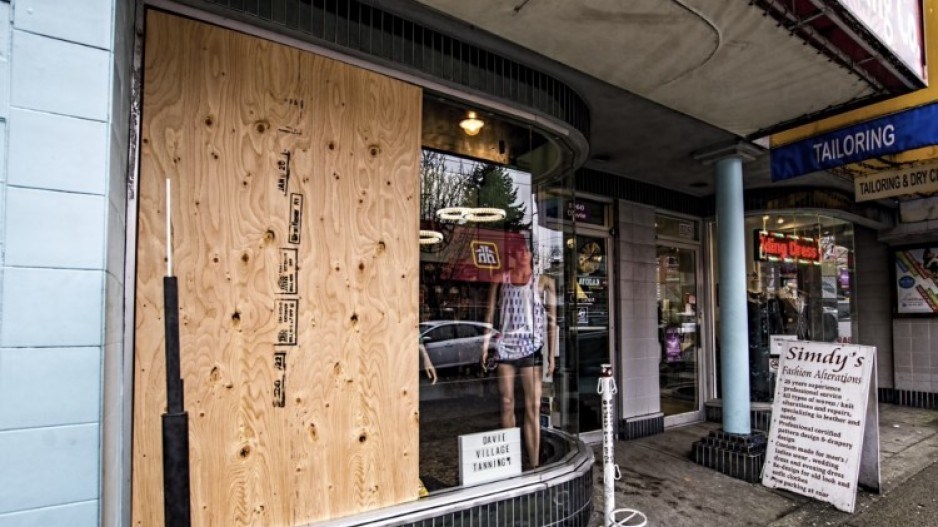B.C. small businesses who were rejected for financial aid under the province’s bureaucratic, onerous and poorly designed vandalism grant program are being encouraged to apply again, after the government effectively reset the whole endeavour.
Jobs Minister Brenda Bailey told the legislature that the numerous businesses victimized by vandalism and crime, but who could not access the provincial grants worth up to $2,000, will get a second shot now that she’s dropped the requirements for a police report and insurance claim.
“All of the applicants who were denied under the old criteria will have the opportunity to be reassessed,” she said during her ministry’s budget estimates.
“The applicants who dropped off because the criteria were a rub for them will be invited to apply.”
Bailey was forced to essentially gut the program, after it was revealed government had only managed to disperse $112,000 out of a $10.5 million pot of money in the first four months of the 13-month program.
At that rate — one per cent of funding in 27 per cent of the elapsed time — the government was on course to leave more than $10 million unspent at a time when cash-strapped small businesses say they are in dire financial straits due the out-of-pocket costs associated with graffiti, broken windows and rising street disorder.
Bailey faced questions in the legislature during her ministry’s budget estimates last week.
“We are in March now, and these issues would have been well known to the minister through all of that public outcry many, many months ago,” said BC United critic Todd Stone, noting the program details were first released last summer.
“Why would it take months to make adjustments to the program to actually push these dollars out the door to help these struggling small businesses? Why has it taken so long?”
Bailey insisted she’d overseen a “very immediate” response.
Stone scoffed.
“At this rate, you're talking about $11,000 per month — it's going to take 75 years to actually make sure that this money gets out the doors to help small businesses,” he said.
That’s “not realistic,” countered Bailey.
“I can share the timeline that once we receive a completed application, the turnaround time is 34 days,” she said.
“With all due respect,” replied Stone, “the great progress that the minister seems to want to wrap as the narrative around this program is ridiculous.”
It was interesting to watch Bailey handle the issue. She barely admitted there was even a problem. At one point she called the revisions “small changes” — as if the core requirements of the program hadn’t been gutted and all the rejected applications restarted after four months of failure to get the money out the door.
“We've listened very carefully to the users, and they've given us very strong feedback,” she said.
“And I can tell you that I'm hearing very positive things from our small business community. They appreciate the changes that we've brought in, because they're exactly what they asked for.”
Only one month ago, Bailey defended the requirement for a police report as an easy step, and an insurance claim as a “reasonable request.”
Businesses bristled at both, saying it made no sense to keep filing police reports and making insurance claims for frequent vandalism, especially when deductibles were often higher than the cost of the vandalism itself, and broken glass and damage has become a near-daily occurrence.
“New information, new thoughts, right?” Bailey said in an interview, when I asked her about the change.
“That's the importance of listening. I was told that this was a problem, and so we wanted to solve it.”
Fair enough.
But what that also means is that the government didn’t actually listen to the right people from the start. The Jobs Ministry took a year to design a program and got it completely wrong. Staff spent hundreds of hours working in the wrong direction, while managers approved the wrong decisions and ultimately the minister green-lit a program that wasn’t workable in the real world.
You’d think that would concern someone inside the government. It’s the kind of thing we are supposed to have an auditor general for.
There’s no sign of any interest within government to figure out how this happened. That, unfortunately, is the most worrying part of this entire debacle.
Rob Shaw has spent more than 16 years covering B.C. politics, now reporting for CHEK News and writing for Glacier Media. He is the co-author of the national bestselling book A Matter of Confidence, host of the weekly podcast Political Capital, and a regular guest on CBC Radio.


